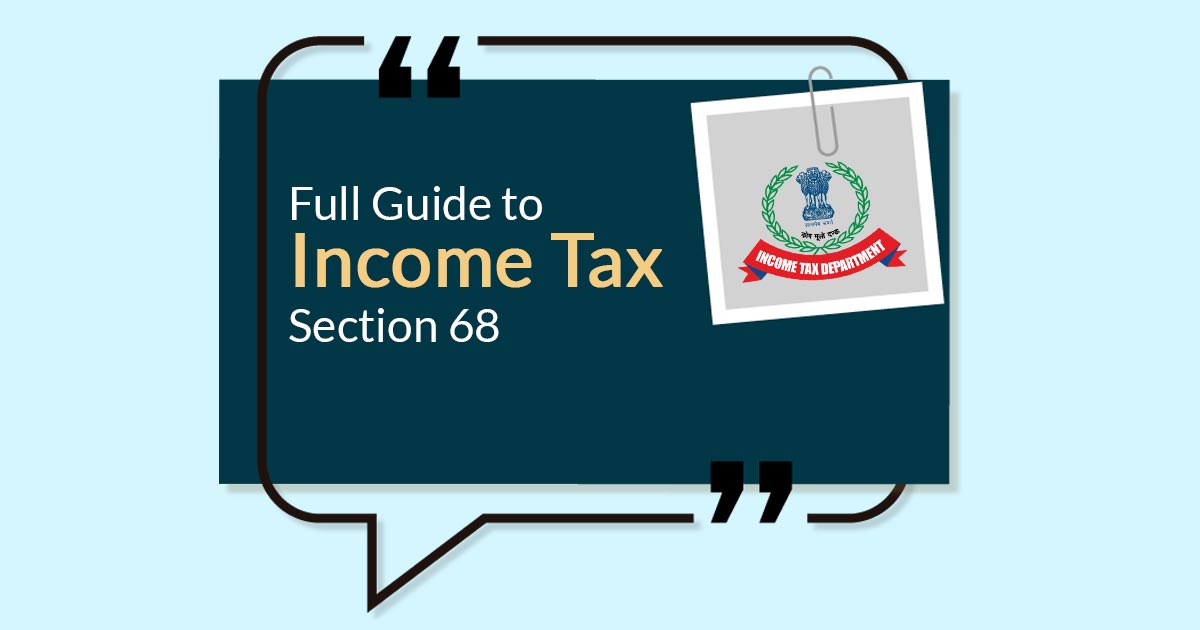
Introduction of Section 68 Under Income Tax
Why Section 68 was introduced under the Income Tax Act, of 1961? There was a need and importance to start the provision of section 68 beneath the Income Tax Act, of 1961 to protect the interest of the revenue as the taxpayer was involved in harmful tax practices to steal the tax in the manner of bogus cash credit entries in the books of account, post to the start of this section various changes have brought out with time for increasing the applicability along with revealing the black money, Accommodation Entries, Cash Credit Entries, and others.
The taxpayers conceal their income by diverting the cash receipts and showing the same to unsecured loans or in any additional form in the books of accounts, hence preventing the payment of the tax on the business receipts. The same is the tax theft and hence its outcome is the tax revenue loss of the Indian Government.
Read Also: Introduction & Applicability of TDS Section 194N on Cash Withdrawal
To limit these malpractices and tax evasion, section 68 arrived with timely change in it.
Explanation of Income Tax Section 68
Where any sum is found credited in the books of an assessee maintained for any previous year, and the assessee offers no explanation about the nature and source thereof or the explanation offered by him is not, in the opinion of the [Assessing] Officer, satisfactory, the sum so credited may be charged to income-tax as the income of the assessee of that previous year :
Provided that where the assessee is a company (not being a company in which the public are substantially interested), and the sum so credited consists of share application money, share capital, share premium or any such amount by whatever name called, any explanation offered by such assessee-company shall be deemed to be not satisfactory, unless
- (a) the person, being a resident in whose name such credit is recorded in the books of such company also offers an explanation about the nature and source of such sum so credited.
- (b) such explanation in the opinion of the Assessing Officer aforesaid has been found to be satisfactory
Provided further that nothing contained in the first proviso shall apply if the person, in whose name the sum referred to therein is recorded, is a venture capital fund or a venture capital company as referred to in clause (23FB)of section 10.
Let us Talk About Section 68 Under Income Tax
Applicability of Income Tax Section 68
Section 68 is subject to apply and is applicable when the taxpayer used to maintain the books of account and there is any sum revealed credited in the books of the taxpayers maintained for the former year and the taxpayer provides no elaboration for these cash credits or elaboration given by taxpayer was not agreeable, then the taxpayer would found guilty beneath the same section and thus the provision of this section will start. All credit entries prompt in the books of accounts of the taxpayer come beneath this section.
“Reliance can be placed Smt. Shanta Devi Vs. CIT [ 1988] 171 ITR 532 ( Punjab & Harayana High Court ). In the abovementioned Case Law, it was held that on perusal of section 68 of the act shows that in relation to the expression ‘Books’ the emphasis is on the word ‘ assessee meaning thereby that such books have to be the books of the taxpayer himself and not of any other taxpayer.”
The Onus to Confirm Income Tax Section 68 of IT Act
The loan on the taxpayer to prove that any sum revealed in the books was a real transaction, the nature and source of these entries must be proved through the taxpayer, and if not then there would be seen as the taxpayer’s income. However, the taxpayer was not needed to prove a “source”, which means the taxpayer was not needed to prove such income source of the person from whom he has obtained the amount.
The taxpayer should be needed to prove him right is the genuineness of the transactions and the creditworthiness of the individual giving the credit and the evidence of the documentary, the same is not the business of the taxpayer to reveal the income source of the person giving the loan or any other credit in any form. Once the taxpayer files enough documents and elaborations, the department has the load to verify that and act, therefore.
Unexplained for Tax Deduction on Cash Credits
The unexplained cash credits are chargeable to tax u/s 115BBE of the Income Tax Act, 1961 at the rate of 60% plus surcharge plus Cess which comes to a comprehensive 78% that too without deduction of any expenses. The real and major intention of beginning the same provision is to impose the tax at higher rates than the normal rates so that the taxpayer will prevent hiding its income.
The concern under rising tax rate from 30% to 60% was to ensure the taxpayer who is concealing their income would not be seen as per the other assessee that both disclosed and undisclosed income will be taxed at roughly 30%, to penalize the tax evaders, the tax rate was raised.